Brunette Ambition (5 page)
Authors: Lea Michele
Tags: #Self-Help, #Personal Growth, #General, #Biography & Autobiography, #Entertainment & Performing Arts, #Fashion & Style
Backstage in character as Young Cosette.
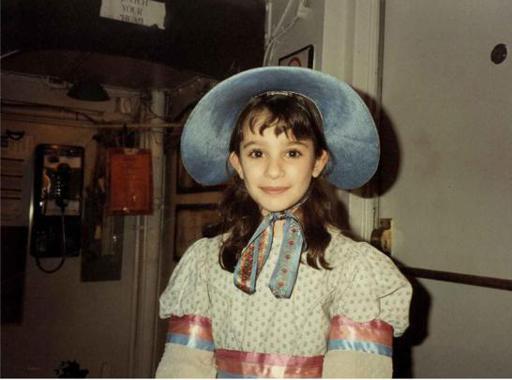
In my Young Éponine costume.
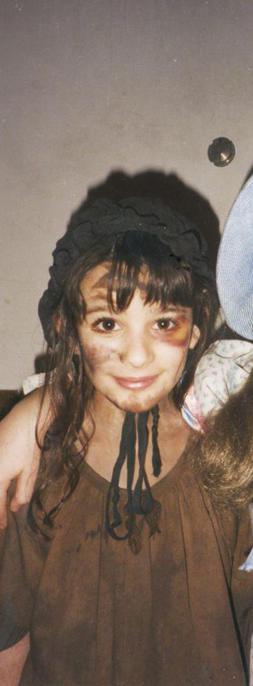
In character as Young Cosette.
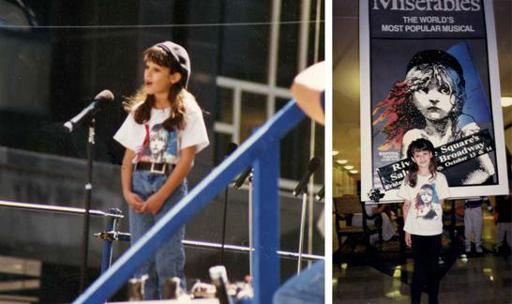
Singing at press events for
Les Mis
.
RAGTIME (1996–1999)
LESSONS LEARNED: THE CRAFT, TEAMWORK, AND PERSEVERANCE
THE CRAFT
While
Les Misérables
had already been running for almost ten years when I joined the cast in 1995,
Ragtime
, an early-twentieth-century period piece, was a newly developed show. As is the case with all new Broadway musicals,
Ragtime
required a yearlong trial run outside of New York City before making its Broadway debut.
Ragtime
would spend this year in Toronto. This was a very big deal for my family, as my mother had never left my father’s side before, much less the country. But they thought it would be a great education for me, since I would get to work with four of Broadway’s greats: Marin Mazzie, Brian Stokes Mitchell (who went on to play my father on
Glee
), Peter Friedman, and Audra McDonald.
My mother and I flew to Toronto and lived there for a year, and that is where I really learned about acting. I never had a singing or acting coach. I’ve taken a few classes from time to time, but for me, experience has always been the best way to learn. And in
Ragtime
, I was learning from the very best. Sure, I played my part, but what I really did was watch these four masters do their thing and absorb as much as possible. Every night, for example, I got to watch Audra McDonald sing her heart out: Every night, she would cry when she sang her song. Her ability to dig deep into her role, to tap into real emotions, to summon that character’s backstory, was astounding. In one scene, Audra had an altercation with a police officer; backstage, before going on, she would ask that actor to berate her, so she could fully feel and express her character’s pain and outrage. I watched her, and Brian, Marin, and Peter, practice their craft and soaked it all up like a sponge. Sometimes you just need to keep your mouth shut and learn.
Audra also taught me how to keep my mind centered on the job I needed to do onstage as Tateh’s daughter, rather than the audience’s reactions to my actions. One night near the beginning of the run, I was peeking out at the audience from behind the curtain. Audra tapped me on the shoulder and said, “If you can see them, they can see you—don’t worry about the people out there, just focus on your role, focus on the show.” And that’s not all. Each evening before I would go onstage, Audra would put her hands around my waist and see how much I could expand my diaphragm. She taught me how to breathe; she taught me the importance of saving my voice, of drinking tea and water, of refusing cigarettes. She always told me that my entire career would be contained between the bottom of my chin and the top of my diaphragm, that God had given me the gift of a voice, and it was my responsibility to take care of it.
TEAMWORK
In
Ragtime
, I played Peter Friedman’s daughter, and so we were pretty much inseparable throughout the show. This was new for me, since I’d never worked so intensely with another actor. I couldn’t be off at any time during that show without directly affecting him. Accountability is literally front and center when you’re a stage actor: The audience—who have all paid dearly for their tickets—can tell when the show isn’t working. I needed to be prepared every day. I owed it to Peter and to all the people who came to see us perform. I took a night off once and my understudy went on in my stead. After, Peter asked me not to take any more breaks. Sure, that sounds extreme, but it underlines how dependent our performances were on each other. And quite frankly, I was relieved and thankful that I was missed; I was young and territorial about my roles.
ACCOUNTABILITY IS LITERALLY FRONT AND CENTER WHEN YOU’RE A STAGE ACTOR: THE AUDIENCE—WHO HAVE ALL PAID DEARLY FOR THEIR TICKETS—CAN TELL WHEN THE SHOW ISN’T WORKING. I NEEDED TO BE PREPARED EVERY DAY.
In fact, when I got
Ragtime
, they pulled my mother aside and asked her about the possibility of rotating the role between me and another girl, and even though I was only ten, and arguably too young to be negotiating my own contract, I jumped right in and told them that I was ready to perform every night—and that if they wanted me, I was doing it by myself. So when Peter told me that he didn’t want me to miss any more performances, it was really another way of saying, “Job well done.”
PERSEVERANCE
After our year in Canada was up, we brought the show to Broadway, which felt like an entirely different place than when I had been on Broadway in
Les Misérables
. Since it was a brand-new show, we were reviewed by the critics, we performed on talk shows, and we eventually performed at the Tony Awards, which are the be-all and end-all of Broadway life.
During
Ragtime
, I learned another very important life lesson, which is that passion can, and should, trump what people say. At the time I wasn’t aware of Ben Brantley (the chief theater critic for the
New York Times
), I just knew that I loved and believed in the show, and no review—good or bad—was going to change my opinion of my job. (The reviews of
Ragtime
were mixed.) My dedication and devotion to
Ragtime
far exceeded anything that anyone could ever say about it. Sure, I was blissfully young at the time, and much of what was happening was over my head (there were lots of politics involving the investors in the show that I was not tuned in to), but learning to let criticism and outside opinions—both good and bad—glance off me is a lesson I still lean on today. Of course feedback is important and should always be considered, but constructive criticism is very different from straight-up opinion. I listened to the director, I listened to my castmates, and most important, I listened to my heart—and then I kept on trying my best.

Backstage at
Ragtime
, dressed up as the little girl.
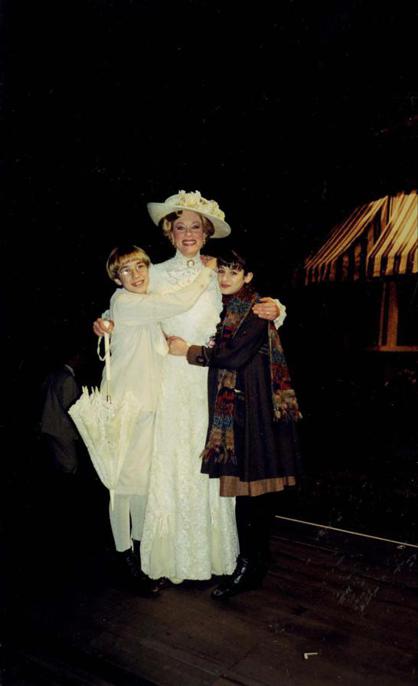
With the incredible Marin Mazzie and my other young costar in
Ragtime
.
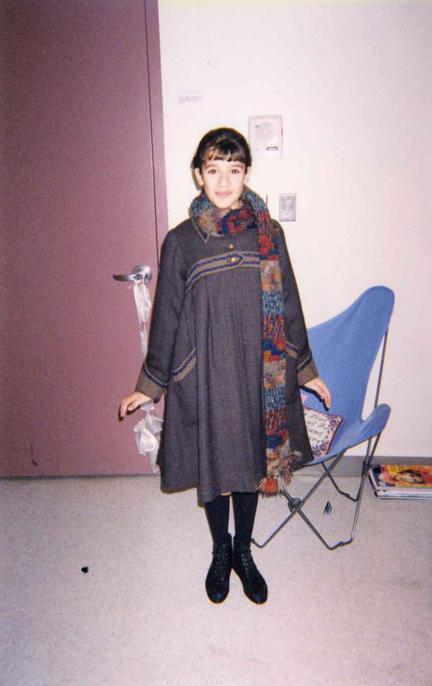
Backstage at
Ragtime
.
I went to the Tony Awards with Peter Friedman that year as his guest; he was nominated for best actor in a musical. I wanted him to win so badly—more than anything in the world—but he lost. I was much more upset than he was when his name wasn’t called, and he turned to me and said, “Lea, it’s okay.” It wasn’t the end of the world for him, and it didn’t change the fact that he was proud of his work. Audra won a Tony that year, but everyone else—Brian, Peter, Marin—lost. Even though they lost, they still went on every night and did an amazing show; even when there was no prize left, they still acted their hearts out.
I was in
Ragtime
for two years. The original cast left the show in one night, a passing of the torch, which is standard practice on Broadway. Working with those actors was an incredible experience; watching them every night was my master class, my Juilliard.
FIDDLER ON THE ROOF (2004)
LESSONS LEARNED: FOCUS AND PATIENCE
FOCUS
When I left
Ragtime
, I was just finishing the eighth grade. Perfect timing, because I couldn’t have been more excited to start high school. I spent the first three years focused on having a relatively normal schedule and life. As we’ve discussed, I needed a chance to take my own pulse and develop interests outside of acting—if only to reaffirm that it was what I really wanted to do. Senior year, life on the stage called again, and I went back to Broadway. I took a part in
Fiddler on the Roof
in 2004 and balanced that final year between school and work.
Fiddler
was a totally different experience for me for many reasons: For one, it was a smaller part, and for another, I was no longer a child. My mom didn’t take me to work anymore. In fact, I got my own apartment in the city and started to feel that my life was really up to me—that I had to do it on my own. While I had a principal role in
Fiddler
as Daughter #4, it wasn’t a huge part, and I had to share a dressing room with about twelve other women, who ranged in age from nineteen to sixty. Most people start out in an ensemble or chorus, but I had been lucky enough to only land featured roles up to that point, where I had my own private space to get ready and focus my mind. This wasn’t to be on
Fiddler
, and I had to quickly adjust to less-than-ideal circumstances. Sharing a room was an education in every sense of the word, and while I can’t say it was fun or that I enjoyed it, I’m glad I experienced it. Whether you’re in an office or backstage, it’s important to be able to quiet your mind even in the midst of tumult. All of the women had their own process, their own drama, their own preshow rituals, and I had to adjust without letting the extra noise derail me from my performance. It took a lot of concentration every day to ignore everything that was happening around me, since it’s imperative that I engage 100 percent with my job so that I can do my very best.